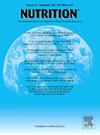Effect of eating alone and depression symptoms on incident disability among community-dwelling older adults
IF 3.2
3区 医学
Q2 NUTRITION & DIETETICS
引用次数: 0
Abstract
Objectives
The intent of the present study was to elucidate the association of eating alone and depressive symptoms with the development of disability among community-dwelling older adults, using a longitudinal study.
Method
Participants included 4648 Japanese older adults (mean age 73.8 ± 5.4 years; 44.3% men) aged ≥ 65 years at the time of the examination. Eating status was divided into two categories: “Eating with others at least once a day” and “Other.” The 15-item Geriatric Depression Scale was used to measure depressive symptoms. Incident disability was certified by long-term care insurance (median duration: 36 months).
Results
During a median follow-up at 36 months, 8.0% of the participants developed an incident disability. Adjusted for covariates, the participants who ate alone were associated with a higher hazard ratio of incident disability compared to those who ate with others (hazard ratio: 1.36, 95% confidence interval: 1.05–1.75). However, adjusted for the covariate depressive symptoms, eating alone was not significantly associated with incident disability. Structural equation models revealed that the indirect model confirmed eating alone habits were associated with disability via depressive symptoms.
Conclusions
This study confirmed that eating alone was associated with an incident disability after adjusting for the covariates. Furthermore, the present study suggests an indirect relationship between eating alone and incident disability via depressive symptoms, the result of the structural equation model.
独自进食和抑郁症状对社区老年人残疾事件的影响。
研究目的本研究旨在通过一项纵向研究,阐明独自进食和抑郁症状与社区老年人残疾发展的关系:参与者包括 4648 名日本老年人(平均年龄为 73.8 ± 5.4 岁;44.3% 为男性),检查时年龄≥ 65 岁。饮食状况分为两类:"每天至少与他人一起进食一次 "和 "其他"。15 项老年抑郁量表用于测量抑郁症状。残疾事件由长期护理保险证明(中位数持续时间:36 个月):结果:在中位数为 36 个月的随访期间,8.0% 的参与者发生了残疾。经协变量调整后,与与他人一起进餐的参与者相比,独自进餐的参与者发生残疾的危险比更高(危险比:1.36,95% 置信区间:1.05-1.75)。然而,在对抑郁症状这一协变量进行调整后,单独进食与残疾事件的关系并不明显。结构方程模型显示,间接模型证实了独自进食习惯通过抑郁症状与残疾有关:本研究证实,在调整协变量后,独自进食与残疾事件相关。此外,本研究还通过结构方程模型的结果表明,独自进食与抑郁症状之间存在间接关系。
本文章由计算机程序翻译,如有差异,请以英文原文为准。
求助全文
约1分钟内获得全文
求助全文
来源期刊

Nutrition
医学-营养学
CiteScore
7.80
自引率
2.30%
发文量
300
审稿时长
60 days
期刊介绍:
Nutrition has an open access mirror journal Nutrition: X, sharing the same aims and scope, editorial team, submission system and rigorous peer review.
Founded by Michael M. Meguid in the early 1980''s, Nutrition presents advances in nutrition research and science, informs its readers on new and advancing technologies and data in clinical nutrition practice, encourages the application of outcomes research and meta-analyses to problems in patient-related nutrition; and seeks to help clarify and set the research, policy and practice agenda for nutrition science to enhance human well-being in the years ahead.
 求助内容:
求助内容: 应助结果提醒方式:
应助结果提醒方式:


